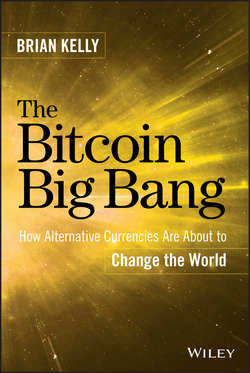Читать книгу The Bitcoin Big Bang - Kelly Brian - Страница 10
На сайте Литреса книга снята с продажи.
Chapter 1
Bitcoin Is a Bubble
Currencies Are a Matter of Trust
ОглавлениеThe question I constantly get is why anyone would accept a bitcoin in the first place. My answer is that, just like any other currency, it is a matter of trust. One must believe that accepting this form of payment means they can use it elsewhere to purchase something they want or need. As long as you have a reasonable expectation that you will be able to convert a currency into a good or service, then “what” the currency is does not really matter. In primitive economic systems that used barter, currency did not exist, but people trusted that if they accepted a fur pelt, it could be used to obtain food and water.
Indeed, there have been crazier things than bitcoin used as currency. A seashell, specifically wampum, was once the currency of the land, Native Americans trusted that wampum could obtain goods and services. Wampum was difficult to obtain, since it lived offshore in the deepest parts of the coastline. However, the most important reason wampum became a currency was trust. When European traders arrived in North America, they immediately recognized the importance of wampum to the Native Americans, and they began trading with the currency. In fact, wampum was legal tender in New England from 1637 to 1661.
Wampum worked well as a currency as long as you were trading goods and services within Native America. However, outside of North America, wampum did not enjoy the same trust, and hence goods could not be purchased with the shells. Eventually, the British pound displaced the seashells, as traveling merchants needed the pound to obtain goods and services outside the wampum ecosystem. Those conducting business within the ecosystem were forced to convert their wampum into pounds, giving birth to the term shelling out.
Another way to think of this matter of trust is through airline frequent flier miles. Some of us use these miles to purchase reward tickets while others use them to upgrade to business class; in either case, these miles are currency. I am willing to hold a balance of miles in my account because I trust that I will be able to use them to purchase a service, a plane ticket. However, I cannot spend my United Airlines miles outside the ecosystem to buy an American Airlines ticket. In this way, wampum and frequent flier miles are similar; they work as a currency only within an ecosystem.
Much like Wampum and frequent flier miles, in the early days, bitcoin was closed ecosystem. As merchants began to accept bitcoin it took on the characteristics of a currency and more merchants meant a higher price for bitcoin. The value of bitcoin was joined with its growing user base. In fact, many emerging currencies exhibit similar trends – unless it is accepted, it has no value. The first digital currency I created was called the BKoin; it sleeps in my computer and is not accepted anywhere. I tried to send some to my wife, but she barely cracked a smile – it is a dead currency.
Thinking of Bitcoin as a payment system is where most Bitcoin Evangelists have their aha moments. Unlike a credit card, where we are charged for the privilege of use and acceptance, making a payment with bitcoins is free and fast. Bitcoin does not require personal information, which should be welcome news to those who shopped at Target during the 2013 holiday season. The Bitcoin payment system has no national boundaries and no requirement for a bank account, making it the ideal technology for international money transfers and serving the underbanked.
Bitcoin was born out of the Great Recession and financial crisis of 2008. It was a reaction to the financial revolution that had occurred over the past 20 years. It gained traction as global central banks began to print money to combat the Great Recession. The early adopters felt that quantitative easing was a threat to their livelihood. But just like food co-ops led to the formation of wholesale clubs, so, too, will Bitcoin lead to more mainstream business adoption.
It took me several attempts to understand that Bitcoin's innovation was the removal of the financial services middleman. The biggest obstacles were the acronyms. In any industry, shorthand tends to confuse the beginner and aid the expert. My inexperience with cryptography, P2P networks, and open-source protocols meant I had a formidable task ahead. Remembering my dream of a private jet, I slogged through the language barrier toward my fortune, unaware that I would someday share this knowledge.
